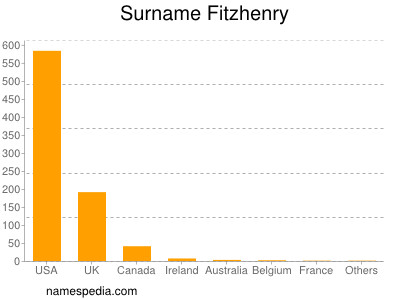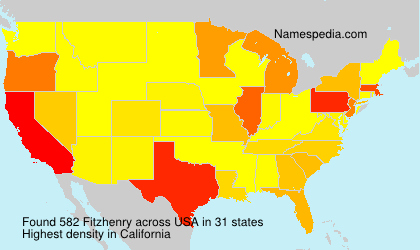Estadísticas y significado del nombre Fitzhenry
Porcentaje de uso: 3% primer nombre, 97% apellido.
El primer nombre Fitzhenry fue encontrado 33 veces en 1 países diferentes. (USA)
El apellido Fitzhenry se utiliza por lo menos 829 veces y por lo menos en 8 países.
 | Primer Nombres
Anne Fitzhenry (7) Daniel Fitzhenry (7) Claire Fitzhenry (7) Craig Fitzhenry (6) Alan Fitzhenry (6) John Fitzhenry (6) Dean Fitzhenry (4) Michael Fitzhenry (4) Carol Fitzhenry (4) Barbara Fitzhenry (4) Andrew Fitzhenry (4) Ian Fitzhenry (4) Anthony Fitzhenry (3) Paul Fitzhenry (3) Sharon Fitzhenry (3) Robert Fitzhenry (3) Nicola Fitzhenry (3) Rebecca Fitzhenry (3) Sara Fitzhenry (3) Craigh Fitzhenry (2) Elaine Fitzhenry (2) Denise Fitzhenry (2) Deborah Fitzhenry (2) Gemma Fitzhenry (2) Melanie Fitzhenry (2) Peter Fitzhenry (2) Richard Fitzhenry (2) Victoria Fitzhenry (2) Nicholas Fitzhenry (2) Neal Fitzhenry (2) Jennifer Fitzhenry (2) Jillian Fitzhenry (2) Margaret Fitzhenry (2) Griffith Fitzhenry (2) Helen Fitzhenry (2) Cameron Fitzhenry (2) David Fitzhenry (2) Anita Fitzhenry (2) Brian Fitzhenry (2) Christie Fitzhenry (2) Caroline Fitzhenry (2) Brenda Fitzhenry (2) Christopher Fitzhenry (2) Conor Fitzhenry (2) Nora Fitzhenry (1) Pamela Fitzhenry (1) Nichol Fitzhenry (1) Angela Fitzhenry (1) Nicole Fitzhenry (1) Amanda Fitzhenry (1) Mary Fitzhenry (1) Annie Fitzhenry (1) Lucy Fitzhenry (1) Lucille Fitzhenry (1) Mark Fitzhenry (1) Martin Fitzhenry (1) Matthew Fitzhenry (1) Allan Fitzhenry (1) Angelo Fitzhenry (1) Raymond Fitzhenry (1) Toni Fitzhenry (1) Thomas Fitzhenry (1) Susan Fitzhenry (1) Trevor Fitzhenry (1) Rick Fitzhenry (1) Yvette Fitzhenry (1) William Fitzhenry (1) Stuart Fitzhenry (1) Steve Fitzhenry (1) Leslie Fitzhenry (1) Abbey Fitzhenry (1) Gerard Fitzhenry (1) Ruth Fitzhenry (1) Sheila Fitzhenry (1) Russell Fitzhenry (1) Pauline Fitzhenry (1) Kaye Fitzhenry (1) Gwyneth Fitzhenry (1) George Fitzhenry (1) Bridget Fitzhenry (1) Hamish Fitzhenry (1) Hannah Fitzhenry (1) Ida Fitzhenry (1) Kenneth Fitzhenry (1) Gavin Fitzhenry (1) Eve Fitzhenry (1) Cindy Fitzhenry (1) Crista Fitzhenry (1) Cole Fitzhenry (1) Daren Fitzhenry (1) Diane Fitzhenry (1) Emma Fitzhenry (1) Dorothy Fitzhenry (1) Isabella Fitzhenry (1) James Fitzhenry (1) Kathryn Fitzhenry (1) Kathleen Fitzhenry (1) Jonathan Fitzhenry (1) Katie Fitzhenry (1) Kayleigh Fitzhenry (1) Leanne Fitzhenry (1) Kimberley Fitzhenry (1) Joanne Fitzhenry (1) Ann Fitzhenry (1) Jane Fitzhenry (1) Jamie Fitzhenry (1) Janice Fitzhenry (1) Jayne Fitzhenry (1) Audrey Fitzhenry (1) Jean Fitzhenry (1) Leon Fitzhenry (1) |

Fitzhenry en reverso es Yrnehztif
El nombre contiene 9 letras - 33.33% vocales y 66.67% consonantes.
Errores de deletreo: Fitzhanry Fitzhenly Fitzhenrry Fetzhenry Fitzhenrw Fitzhenryi Fizthenry Fizthenyr Fitzherny
Rimas: Henry citizenry Freemasonry falconry masonry plenary memory sedimentary dispensary intercessory
Significado del nombre Fitzhenry es: The son of Henry. See Henry
Sheila Fitzhenry says: The Strongbowian invaders added their Norman conventions for surnames to the previousy established Irish system for hereditary surnames. One of the most frequent forms of surnames for both cultures was the patronymic surname, which was formed from the name of the bearers' father or grandfather. The Norman tradition that the followers of Strongbow brought with them created such a surname through diminutive suffixes such as -ot, -et, -un, -in, or -el. Occasionally, two suffixes were combined to form a double diminutive, as in the combinations of -el-in, -el-ot, -in-ot, and -et-in. The Normans also formed patronymic surnames in a manner very similar to the Irish; they added a prefix to their fathers' name.These Anglo-Norman people, however, used the prefix Fitz-, which was derived from the French word fils, and ultimately from the Latin filius, which both mean son. Although this prefix probably originated in Flanders or Normandy, it can now only be found in Ireland. The surname Fitzhenry is derived from the personal name Henry, which was brought by the Normans into England and then Ireland. This name is composed of the elements haim or heim, which mean home, and ric, which means power. Harris was a patronymic form of Henry. The name features the distinctive Irish patronymic prefix fitz, which means son of in Anglo-French. This is derived from the Old French word fils, which ultimately comes from the Latin word filius. The Gaelic form of the surname Fitzhenry is Mac Einri or Ni giolla Enri. Since 1172, the year of the Anglo-Norman invasion of Ireland, the history of the family name Fitzhenry has been woven into the romantic green fabric of the Island as surely as if the name had been native Irish. Legend and tradition have been merged with documentary evidence in books of noted historians O'Hart, McLysaght, O'Brien and other Irish historians as well as transcripts from the Book of Kells, the Falaise Rolls, Battel Abbey Rolls, the Wace poem, Irish Parish records, and ancient land grants, to compose this history of the name. The conclusions are that the first record of the name Fitzhenry was found in County Wexford where they were granted lands by Strongbow on his invasion of Ireland in 1172. Although the name, Fitzhenry, occurred in many references, from time to time the surname was recorded as Fitzhenry, Fitzharris, and these changes in spelling frequently occurred, even between father and son. It was not uncommon for a person to be born with one spelling, married with another, and to have yet another recorded at his wake. From Spain, the great Milesian King sent his son north to explore the Irish coast. Finding that his son had been murdered in Ireland by the three resident Kings (the Danans), Milesius gathered an army to take his revenge on the Irish. He died before he embarked on the trip. His remaining eight sons conquered Ireland and renamed it the land of the Scoti. More than a millennium later, in 1172 A.D., Dermott McMurrough, in his fight for the position of Ard Ri, requested Henry II of England for assistance. Henry of England commanded the Earl of Pembroke, nicknamed Strongbow, to help Dermott in his fight for the crown of Ireland. Strongbow ecruited 2000 trained mercenaries of Norman, Welsh, or Cornish background from South Wales and sailed for Ireland. The battles against the untrained, badly clad Irish were short, swift and sure, but, in the end, it was Henry and Strongbow who held the reins of power in Ireland, not Dermott McMurrough. Strongbow doled out to his army commanders much of the confiscated Irish land in Southern Ireland. Ironically, after several centuries, the invaders became as Irish as the native families. This now Irish family Fitzhenry emerged as a distinguished family in County Wexford. Myles Fitzhenry was thought by many to be the natural son of King Henry II of England who accompanied Strongbow into Ireland. Myles Fitzhenry and his followers advanced into Kildare in the year 1206 and occupied the northern half including the Baronies of Clane and Salt. They drove the clan Keogh from these their ancient Irish territories. Later the family seat of the Fitzhenrys became Kilkevan in County Wexford and gradually became as Irish as the native Irish. Notable amongst the family up to this time was Myles Fitzhenry. In 1845, the great famine culminated several years of famine causing widespread poverty and starvation, and the great exodus from Ireland began. Within fifty years the population was reduced to less than half. Many joined the armada of sailing ships which sailed from Belfast, Dublin, Cork, Holyhead, Liverpool and Glasgow, all bound for the New World. Some called these small ships the "White Sails", others, more realistically, called them the "Coffin Ships", voyaging across the Atlantic when 25% of the passengers died of many diseases and the elements. In North America, early immigrants bearing the Fitzhenry family name included Nicholas Fitzharris who settled in Philadelphia in 1855 along with Peter; Thomas Fitzhenry arrived in Pennsylvania in 1773; Richard Fitzhenry arived in Philadelphia in 1871. Many moved westward with the wagon trains, and settled the mid west, some trekking over the rockies to the west coast. Some emained loyal to the crown during the American War of Independence and moved north to Canada, becoming known as the United Empire Loyalists. Others formed the Irish Brigades in the great struggle for independence. Prominent bearers of the surname Fitzhenry in recent times include: Damien Fitzhenry, and Irish Sportsman. He was the goalkeeper on the Wexford senior hurling team. Daniel Fitzhenry (b1979), in Macksville, New South Wales is an Australian rugby league player. The coat of arms found for a bearer of the Fitzhenry surname did not include a motto. Under most heraldic authorities, a motto is anoptional component of the coat of arms, and many families have chosed not to display a motto.
Esta página fue visitada por los siguientes paises:












Dominios Fitzhenry.com - REGISTERED Fitzhenry.net - REGISTERED Fitzhenry.co.uk - UNKNOWN Fitzhenry.de - FREE |
Personas Famosas: Daniel Fitzhenry, Damien Fitzhenry, Louis Fitzhenry
Autores: Kathryn Fitzhenry, Kevin Fitzhenry, Bob Fitzhenry, James Fitzhenry, Alyxandra Harvey-Fitzhenry, Fitzhenry and Whiteside, Robert I. Fitzhenry
Búsquedas recientes: Janir Pesavento Abeyawardene Skeffers Altan Ranghella Karacheban Haddag Chizue Kohzad
Los más buscado: Brian Evans Suchocki Dragos Davide Vitelaru Martin Ali Aaishah Zrubek
Los nombres al azar: Haensch Tharl Masbahi Sadrollah Sashauna Delplanche Monjolo Ascencao Varaidzo Iturregui
Deja un comentario...